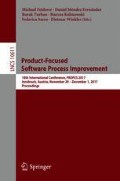Abstract
Software project success has various facets and definitions ranging from customer satisfaction over software quality to the degree of implemented vs. not implemented requirements. Customers, developers and project leaders strive for project success. During the development process, they try to pay attention to aspects which are perceived to be important for a satisfying project execution from their individual point of view. These aspects may vary according to the underlying definition and understanding of project success. Different views on the importance of aspects like communication can cause problems and complicate the collaboration due to different expectations and misunderstandings.
In a study with 97 student participants and eight customers, we examine which factors are perceived to be important for a successful project execution. In order to unfold discrepancies, we analyze whether the views of customers and developers on the relevance of aspects like communication and fulfilling the requirements specification differ from each other. According to our results, communication is most important for both the team and the customer. But they have different ideas of the term: The correct exchange of information between the team and the customer as well as the team-internal communication.
In particular rather inexperienced developers and customers should be aware of different ideas of terms like communication for a successful project execution. It is not sufficient to know that communication is important. Being aware of different ideas can facilitate the collaboration and avoid problems due to misunderstandings.
References
Agarwal, N., Rathod, U.: Defining “Success” for software projects: an exploratory revelation. Int. J. Proj. Manag. 24(4), 358–370 (2006)
Forza, C.: Survey research in operations management: a process-based perspective. Int. J. Oper. Prod. Manag. 22(2), 152–194 (2002)
Hoda, R., Noble, J., Marshall, S.: The impact of inadequate customer collaboration on self-organizing agile teams. Inf. Softw. Technol. 53(5), 521–534 (2011)
Hofmann, H.F., Lehner, F.: Requirements engineering as a success factor in software projects. IEEE Softw. 18(4), 58 (2001)
Karras, O., Klünder, J., Schneider, K.: Indicating potential risks for project success based on requirements fulfillment - analyzing requirements compliance in student software projects. In: Gesellschaft fr Informatik, Fachgruppentreffen Requirements Engineering, Stuttgart (2016)
Keil, M., Carmel, E.: Customer-developer links in software development. Commun. ACM 38(5), 33–44 (1995)
Klünder, J., Unger-Windeler, C., Kortum, F., Schneider, K.: Team meetings and their relevance for the software development process over time. In: Proceedings of 43th Euromicro Conference on Software Engineering and Advanced Applications (SEAA) (2017)
Philippo, E.J., Heijstek, W., Kruiswijk, B., Chaudron, M.R.V., Berry, D.M.: Requirement ambiguity not as important as expected—results of an empirical evaluation. In: Doerr, J., Opdahl, A.L. (eds.) REFSQ 2013. LNCS, vol. 7830, pp. 65–79. Springer, Heidelberg (2013). doi:10.1007/978-3-642-37422-7_5
Polanyi, M.: The Tacit Dimension. University of Chicago Press, Chicago (2009)
Savolainen, P., Ahonen, J.J., Richardson, I.: Software development project success and failure from the supplier’s perspective: a systematic literature review. Int. J. Proj. Manag. 30(4), 458–469 (2012)
Surian, D., Tian, Y., Lo, D., Cheng, H., Lim, E.P.: Predicting project outcome leveraging socio-technical network patterns. In: Proceedings of the 17th European Conference on Software Maintenance and Reengineering (CSMR). pp. 47–56. IEEE (2013)
Verner, J., Cox, K., Bleistein, S., Cerpa, N.: Requirements engineering and software project success: an industrial survey In Australia and the US. Australas. J. Inf. Syst. 13(1), 225–238 (2005)
Wohlin, C., Runeson, P., Höst, M., Ohlsson, M.C., Regnell, B., Wesslén, A.: Experimentation in Software Engineering. Springer, Heidelberg (2012). doi:10.1007/978-3-642-29044-2
Acknowledgment
This work was funded by the German Research Foundation (DFG) under grant number 263807701 (Project TeamFLOW, 2015–2017).
Author information
Authors and Affiliations
Corresponding author
Editor information
Editors and Affiliations
Rights and permissions
Copyright information
© 2017 Springer International Publishing AG
About this paper
Cite this paper
Klünder, J., Karras, O., Kortum, F., Casselt, M., Schneider, K. (2017). Different Views on Project Success. In: Felderer, M., Méndez Fernández, D., Turhan, B., Kalinowski, M., Sarro, F., Winkler, D. (eds) Product-Focused Software Process Improvement. PROFES 2017. Lecture Notes in Computer Science(), vol 10611. Springer, Cham. https://doi.org/10.1007/978-3-319-69926-4_39
Download citation
DOI: https://doi.org/10.1007/978-3-319-69926-4_39
Published:
Publisher Name: Springer, Cham
Print ISBN: 978-3-319-69925-7
Online ISBN: 978-3-319-69926-4
eBook Packages: Computer ScienceComputer Science (R0)

